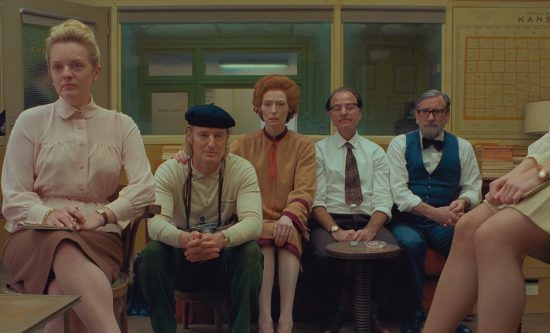LFF 2021 Review: The French Dispatch – “Everything You Want from a Wes Anderson Movie, and Plenty That You Didn’t”
I’ll start with an anecdote about Wes Anderson, king of anecdotal cinema. I had been invited to a screening of The Life Aquatic, and afterwards, questions were permitted. Shaking with nerves in a crowd of 300, I stood up, took the mic and looked the director straight in the eye. I asked him about what had most struck me during the movie, which was whether he deliberately wanted to glamourise smoking in his films? Was he actively railing against an anti-smoking age? The words hung in the air, I’d naively considered this question to be cool and non-judgmental – Wes, you’re an outsider, I’m an outsider, we’re in this together. In those moments afterwards, I died a little. He gave me a long, silent, death stare, before defiantly spitting “No.” and quickly moving on. A single peal of someone’s nervous laughter ringing in my ears as I handed back the mic. Well, who’s laughing now, Wes? (…he is, it’s still him).
What I do have is this blank page and the ability to double down on my question. Okay Wes, you want to tussle? Let’s tussle.
In The French Dispatch, not only does Anderson take the glamourisation of smoking to a whole new level, he adds casual misogyny, cultural discrimination and light homophobia to the mix. And yet, he does this so artfully. Nobody makes cinema like Anderson, which means my criticisms will likely fall on deaf ears. Make no mistake, The French Dispatch is a stunning feat of visual entertainment, from monochrome to pastel palate, bursting with stars, who grace the screen (often only for moments) in a beautifully-staged series of vignettes. The film also draws inspiration from a number of real writers and is a touching homage to journalism.
The plot is only vaguely relevant to the experience of watching The French Dispatch. Set in the 1970s, Bill Murray plays Arthur J Howitzer II, the editor of a magazine (the titular ‘Dispatch’) a copycat New Yorker. Howitzer has run the magazine in a French town called Ennui (ahem) at a loss for years, and we find him planning the latest issue without wanting to cut any of his staff’s written pieces. The film then cycles through the various departments and writers showcasing their literary expertise. Via a huge rotating cast, we consume food culture, cycling, politics, art, romance and a lot more, each piece drawn from real experience’ and all shown using Anderson’s trademark symmetrical style, camera passing through staged tableau, punctuated with shots of colour, animation and many genuine laughs.
Like most people who love Anderson’s eye (big fan of Moonrise Kingdom), it’s easy to become blasé about how well put together this film is, one more time – the staging takes real effort which Anderson pulls off seemingly effortlessly. However, this time around, there is too much going on and hardly anyone gets to shine (watching this is like living the Di Caprio Once Upon a Time in Hollywood pointing meme for eternity) as Saoirse Ronan, Liev Schreiber, Elisabeth Moss and so many others perform for minutes or often, seconds. Others do get to have fun, Anderson is at his best when he directs one person doing one thing, which he does with sections featuring Tilda Swinton, Owen Wilson and Jeffery Wright. The issue is that Anderson’s use of 70’s morality in 2021 is very off-putting. Each of the larger sections are just straight up problematic. Lea Seydoux is required to be naked for large portions of her section. The film stereotypes all French women as sexually-obsessed, which is a shame as Lyna Koudri’s character is a great addition when she’s not asking to get into the boy’s boarding school dorms. The male gaze lingers unnecessarily throughout, whereas Wright’s character (coincidentally called Roebuck Wright) is gay and portrayed as a sad, lonely and isolated man, which may or may not be realistic, but is definitely stereotypical. Anderson is always more at home with straight white men and Adrien Brody gives a mesmerising performance as art dealer Cadizio. But Frances McDormand’s writer is a textbook old maid and Stephen Park’s chef is an almost mute Korean parody.
The French Dispatch is compelling, visually arresting, entertaining and touching. It’s also needlessly offensive, too long and over-stuffed. Basically, it’s everything you would ask for from a Wes Anderson movie, and plenty that you didn’t. A shorter film, and some non-white, non-straight perspectives could have turned this into a masterpiece. Mic drop.










